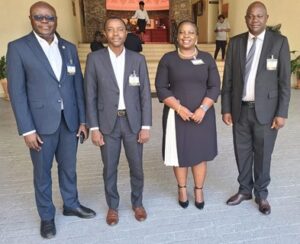
The CEO of Uganda Retirement Benefits Regulatory Authority (URBRA), Mr. Martin Nsubuga, has been re-elected to the Executive Committee of the International Organisation of Pension Supervisors (IOPS), for a third time running. He was first elected in 2019, re-elected in 2021, and again in 2023.
Uganda joined IOPS in 2014, when URBRA had just made 3-years in active sector oversight and supervision. URBRA therefore got an opportunity to be nurtured by experts and experienced Pension Supervisory Agencies in the World.
So how did Mr. Nsubuga get into IOPS elective processes? “Uganda was subjected to peer review on our compliance with best practices and implementation of the IOPS Principles of Private Pension Supervision in 2019. Out of the ten IOPS principles issued in 2010, we had fully implemented four and broadly implemented five by 2019. Uganda was highly rated and that was my motivation to compete for the Executive position,” he recalls.
The IOPS was established in 2004 to improve the quality and effectiveness of the supervision of private pension systems throughout the world, thereby enhancing their development and operational efficiency, and allowing for the provision of a secure source of retirement income in as many countries as possible. The organisation currently has 85 members and observers, representing 75 countries and territories throughout the world.
The IOPS, Executive Committee comprises 15 members, representing at least three continents. Mr. Nsubuga is one of the five representatives from Africa, others being from Egypt, Kenya, Namibia, and South Africa. The other continents are represented by Australia, Austria, Brazil, Croatia, Germany, Hong Kong (China), India, Mexico, Romania, and Slovak Republic.
“To qualify for elective position, you must be a member of IOPS. You must have adopted IOPS best practices and principles of Pension Supervision. You must be subjected to a peer evaluation and required to score 80% and above. Additionally, your agency should regularly share knowledge and best practices with other members during IOPS meetings, in addition to contributing to research projects. Uganda has done all these and have regularly made presentations to the IOPS meeting and shared quality deliverables to the IOPS secretariat,” Mr Nsubuga explains.
Being part of the IOPS has benefitted Uganda’s pensions and retirement benefits sector tremendously. URBRA has shared and drawn upon the experiences of a broad membership of pension supervisors, and applied the lessons to its own jurisdiction, bringing about great improvements in Uganda’s regulatory and supervisory space.
Specifically, Uganda has contributed to research projects and working papers in the following areas:
- introduction of automatic enrolment programmes to increase private pension coverage;
- designing the pay-out phase;
- controlling and reducing costs and fees and ensuring value for money pension scheme;
- nonstandard work arrangements and retirement income;
- factors impeding effective delivery of retirement income;
- design features of funded pensions affecting participation, contribution levels and pension outcomes of individuals in non-standard forms of work;
- roadmap for the good design of DC pension plans;
- supervision of cybersecurity in private pension arrangements (risk-based supervision and/or cybersecurity);
- supervision of infrastructure investments;
- update on the adoption of the IOPS Supervisory guidelines on the integration of Environmental Social and Governance factors in the investment and risk management of pension.
During Mr. Nsubuga’s new tenure, he will aspire to make URBRA the model Regulator in the region on incorporating of ESG factors in investment and the lead Agency with the most robust and dynamic risk-based supervision system. “In addition, we are motivated to finding a solution to the region’s coverage concerns through technical dialogs and discussions platform. Hosting the Africa Pension Supervisors Association’s meetings is one way to discuss regional policy issues and learning from advanced economies largely under the IOPS umbrella,” he said.

